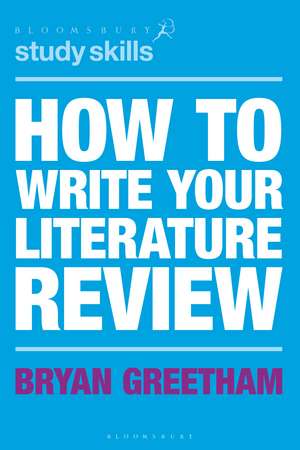How to Write Your Literature Review
Autor Bryan Greethamen Limba Engleză Paperback – 11 dec 2020
Preț: 117.06 lei
Preț vechi: 132.78 lei
-12% Nou
Puncte Express: 176
Preț estimativ în valută:
22.40€ • 24.33$ • 18.82£
22.40€ • 24.33$ • 18.82£
Carte disponibilă
Livrare economică 01-15 aprilie
Livrare express 18-22 martie pentru 42.97 lei
Preluare comenzi: 021 569.72.76
Specificații
ISBN-13: 9781352011043
ISBN-10: 1352011042
Pagini: 320
Dimensiuni: 156 x 234 x 27 mm
Greutate: 0.45 kg
Ediția:1st ed. 2021
Editura: Bloomsbury Publishing
Colecția Bloomsbury Academic
Locul publicării:London, United Kingdom
ISBN-10: 1352011042
Pagini: 320
Dimensiuni: 156 x 234 x 27 mm
Greutate: 0.45 kg
Ediția:1st ed. 2021
Editura: Bloomsbury Publishing
Colecția Bloomsbury Academic
Locul publicării:London, United Kingdom
Caracteristici
Enlivened by examples and practice exercises which enable students to test their understanding and apply ideas to their own work
Notă biografică
Bryan Greetham was educated at the universities of Kent and Sussex. He holds a PhD in moral philosophy from the University of Newcastle, Australia. He is currently engaged in research into moral thinking and the Holocaust, and teaches philosophy at the University of Maryland. He is the author of How to Write Better Essays, How to Write Your Undergraduate Dissertation, Smart Thinking,Thinking Skills for Professionals and Philosophy.
Cuprins
Introduction PART 1: TYPES OF LITERATURE REVIEWS 1. Stand-Alone Literature Reviews 1: Non-systematic 2. Stand-Alone Literature Reviews 2: Systematic 3. Literature Reviews for Dissertations and Theses PART 2: SEARCHING YOUR SOURCES 4. How to Generate Your Own Ideas 5. Finding a Research Question 6. How to Search 7. Searching the Internet PART 3: PROCESSING IDEAS 8. Critically Evaluating Your Sources 1: The Arguments 9. Critically Evaluating Your Sources 2: The Evidence and Language 10. Analysing Concepts 1: Finding Connections between Ideas. 11. Analysing Concepts 2: Adapting Structures of Ideas 12. Synthesis-Creating Patterns and Finding Gaps PART 4: ORGANISING YOUR WORK 13. Managing Your Time 14. Managing your Material 15. Reading 16. Note-Taking PART 5: PLANNING YOUR REVIEW 17. Deciding Which Sources to Use 18. Planning the Review 19. Integrating Your Review with Other Chapters PART 6: WRITING YOUR REVIEW 20. Discussing the Literature 21. The First Draft 22. Finding Your own Voice 23. Style: Simplicity and Economy 24. Finding the Right Words PART 7: USING YOUR SOURCES 25. Plagiarism 26. Citing Your Sources PART 8: EDITING 27. Revision 1: Structure 28. Revision 2: Content Conclusion.
Recenzii
This straightforward book leads students through the processes involved in undertaking literature reviews and offers structured advice for anyone wanting to learn the subtleties and nuances of reviewing literature.
Demonstrates a sound understanding of the issues students need to address when writing a literature review. A very useful guide which I will be recommending to my students.
The author reassuringly acknowledges concerns that I've seen commonly arise with students who are tasked with writing literature reviews, and gives specific, practical guidance about how to work effectively through the various stages.
Demonstrates a sound understanding of the issues students need to address when writing a literature review. A very useful guide which I will be recommending to my students.
The author reassuringly acknowledges concerns that I've seen commonly arise with students who are tasked with writing literature reviews, and gives specific, practical guidance about how to work effectively through the various stages.
